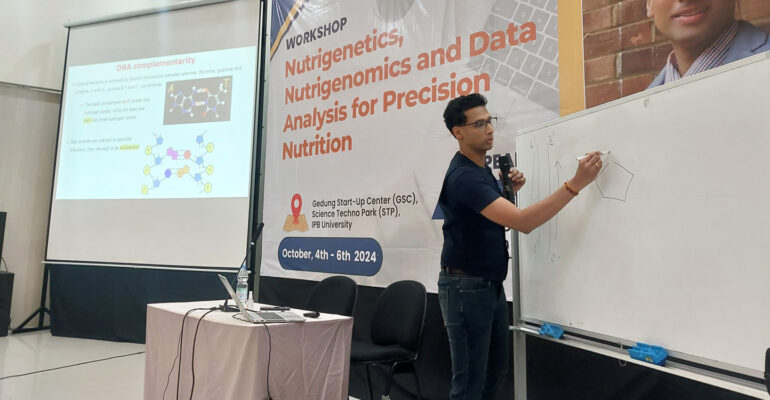
Visiting Professor Series: Department of Community Nutrition at IPB University Hosts Nutrigenetics and Nutrigenomics Expert from the University of Reading
Visiting Professor Series: Department of Community Nutrition at IPB University Hosts Nutrigenetics and Nutrigenomics Expert from the University of Reading
The Department of Community Nutrition, Faculty of Human Ecology (Fema) at IPB University, successfully held a series of activities under the Visiting Professor Program from October 2-7. The event included a public lecture, conference, and a workshop titled Nutrigenetics, Nutrigenomics, and Data Analysis for Precision Nutrition.
The program was organized with support from the IPB University’s International Research Institute for Food, Nutrition, and Health, through the 2024 PUAPT Grant Program.
For this program, the Department of Community Nutrition invited Prof. Vimal Karani S, a professor in nutrigenetics and nutrigenomics from the Department of Food and Nutritional Sciences at the University of Reading, UK. Prof. Vimal is also the Associate Director of the Institute for Food, Nutrition, and Health at the University of Reading.
During his visit, Prof. Vimal served as the keynote speaker and instructor for a three-day workshop held at the Startup Center Building (GSC) in IPB University’s Science Techno Park. The workshop was attended by 35 participants, including faculty members from the Department of Community Nutrition and undergraduate, master’s, Ph.D. students, and dietitian professional students.
The first day began with a welcome address by Dr. Zuraidah Nasution, Secretary of the Department of Community Nutrition. She expressed hopes that the program would broaden participants’ understanding of nutrigenetics and nutrigenomics, and enhance their data analysis skills in genetic and health information using SPSS software.
“This is an exciting topic because this workshop not only includes lectures but also practical data analysis with SPSS. We hope this workshop will expand our knowledge and research capabilities, especially in Nutrigenetics and Nutrigenomics. Stay engaged and make the most of the knowledge that Prof. Vimal will share,” Dr. Zuraidah remarked.
Prof. Vimal then presented fundamental genetics topics, including cell organelles, DNA, RNA, and genetic epidemiology, along with nutrigenetics, nutrigenomics, and epigenetics. He emphasized that each person’s unique genetic makeup is influenced by the environment. For instance, someone with genes that increase obesity risk may be more susceptible when exposed to environments that encourage unhealthy behaviors, such as frequent consumption of fast food and lack of exercise.
“However, by adopting a healthy lifestyle and maintaining gut microbiota balance, high risks can be transformed into lower risks,” he explained.
The second day focused on SPSS data analysis practice, where Prof. Vimal guided participants in analyzing genetic and health-related data. The third day concluded with assessments, discussions, and closing remarks.
Participants showed great enthusiasm throughout the workshop, asking numerous questions and engaging directly with Prof. Vimal. After the workshop, they provided feedback, stating that the content was highly engaging, clearly presented, and easy to understand.
“In the future, we hope to continue our collaboration with the University of Reading through various other academic activities,” Dr. Zuraidah added.
*(*/RZ; AHM)*


